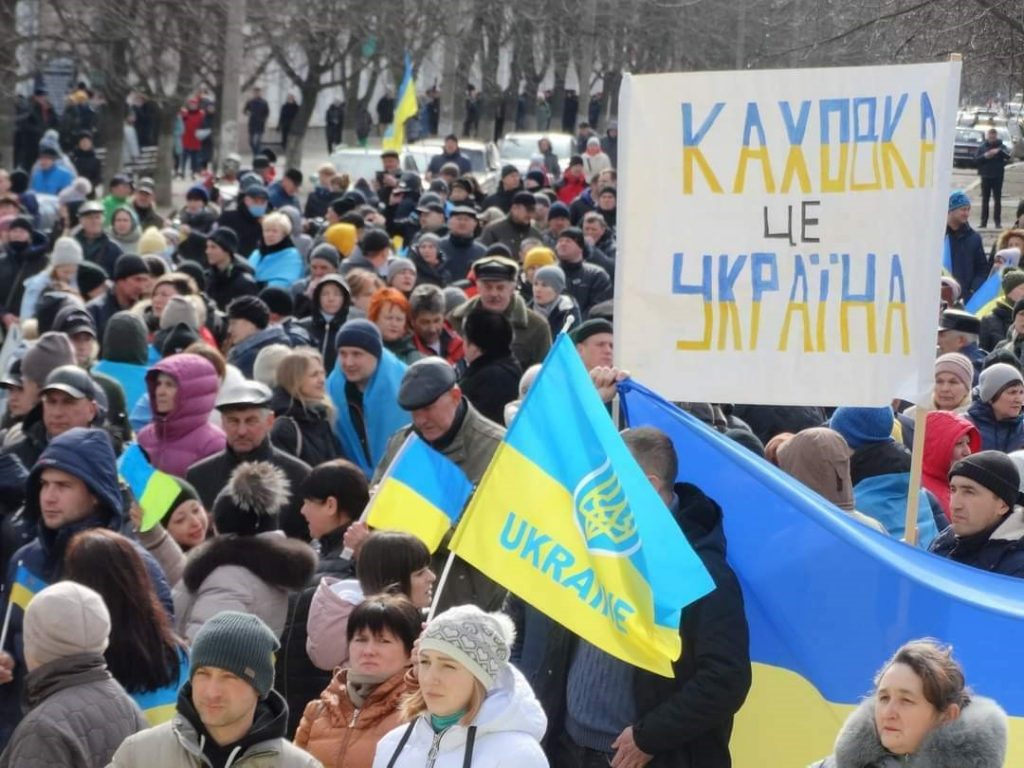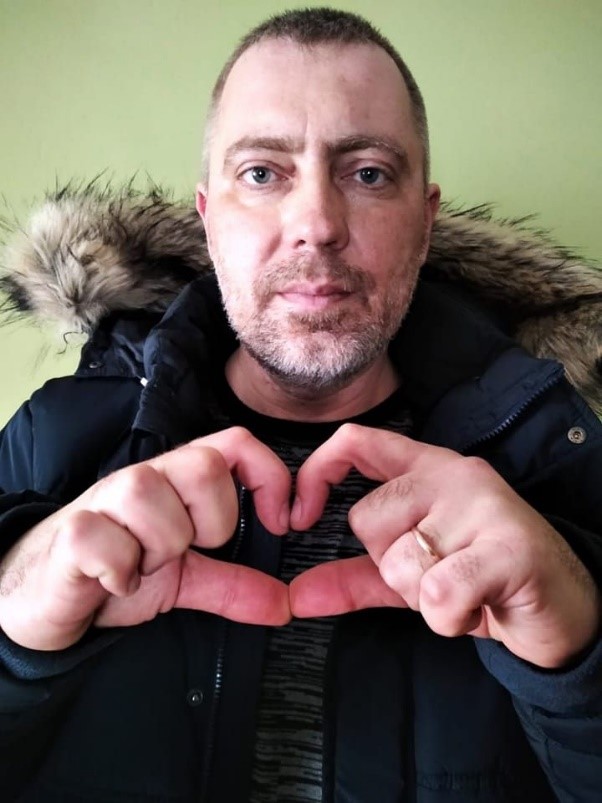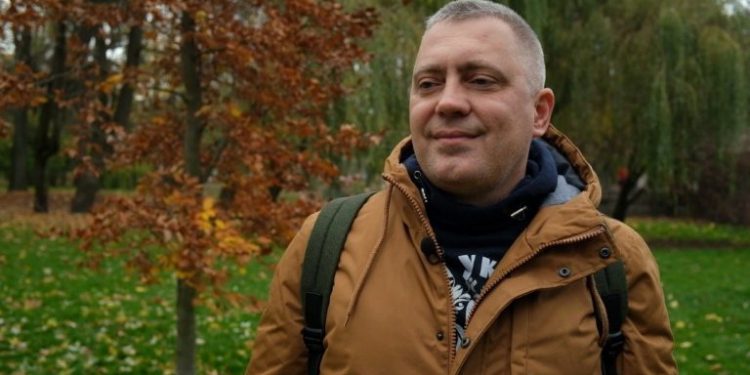39 days under occupation. Nine days in captivity. A bag over his head, interrogations, torture, and humiliation. All of this was endured by Oleg Baturin, a journalist from Kherson who hails from Kakhovka. But thanks to an unexpected stroke of luck, the correspondent of the newspaper Novyi Den managed to escape from the clutches of the occupiers.
Since 2002, Oleg Baturin has been a dedicated correspondent for the Kherson newspaper Novyi Den, covering almost half of the region under his keen journalistic eye. In addition to this, after the annexation of Crimea, he founded the civil organization Europrostir, whose members conducted journalistic investigations about life in the occupied territories. Little did Oleg know that he would find himself in both occupation and captivity one day.
“I kept working because there was a massive wave of information.”
— We woяe up with a series of loud explosions. Although we had suspicions that Russia might attack, there was hope it wouldn’t happen. The first feeling prevailed. As soon as I started browsing social media, I received numerous real-time messages from people across different corners of the Kherson region. They reported that many Russian military vehicles were advancing in Henichesk, Kalanchak, and on the left-bank highways. This was another confirmation that the war had indeed begun, — Oleg recalled.
Oleg suddenly suggested to his wife to take a ride through the city and see what was happening.
— I made a huge mistake because such ‘walks’ around the city could cost us our lives. We spoke with the local authorities, and they were in panic. As we drove, we saw columns with the letter ‘Z’ heading towards Tavriysk. From the very first day, it was known that the Russians were shooting people they encountered on their way, which is why my proposal was sheer madness. We witnessed anti-aircraft defense systems ablaze, protecting the skies above the hydroelectric power station. Jet planes flew above our heads. It was terrifying, not only because of what we saw but also because we couldn’t comprehend what to do next — our interviewee continued his account.
The residents of Kakhovka who didn’t leave the city with the first explosions quickly lost the chance to do so at all. The city was occupied within a few hours, leaving Oleg with no choice but to wait for the right moment while continuing to work.
— I kept working because there was a massive wave of information, much of it exclusive, that no one else had: details about what was happening in the city and surrounding communities. This information was socially crucial; it even helped people save their lives, — says Oleg.
In February, amidst the war, the people of Kakhovka were not concerned about their safety; they were focused on resisting the enemy. They held rallies, waving blue and yellow flags and expressing their support for Ukraine while demanding the Russian invaders leave. Oleg Baturin, a journalist, was among those passionately involved.
— There was such a strong sense of unity! People were filled with anger and readiness to confront the Russians. We made it clear to the enemy that Putin and his Russia were not welcome. I was overwhelmed by these powerful emotions, — Oleg said.

“That`s when I realized that I heard Sergey’s voice from captivity.”
As tensions escalated, Ukrainians participated in peaceful protests, while the enemy targeted vocal patriots, war veterans, local authorities, and journalists. By early March, there were over 400 official reports of abductions. Oleg himself ended up in captivity by Russian FSB agents shortly after a phone call with a friend.
— On March 12th, an acquaintance named Serhiy Tsyhipa from Nova Kakhovka called me and asked for a meeting. He had expressed concerns on social media about feeling in danger and said he would call if needed. So, he called me during lunchtime and said he urgently needed to meet. I agreed, but only if the meeting took place in Kakhovka. We scheduled to meet at 5:00 PM at the bus station, but Russian military personnel captured me when I arrived. They wore masks and weapons and began to beat me, and that’s when I realized that I heard Sergey’s voice from captivity. They subjected me to humiliating interrogations, threats, and beatings.
— They were trying to extract information about the organizers of the rallies, unable to believe that people would take to the streets to resist without external influences. When they couldn’t get anything out of me, they intensified the psychological pressure. I heard others being tortured daily. Typically, they would come to the cells of veterans twice a day, beating, torturing, and sometimes killing them. Among the prisoners were various individuals, like a young man out with his girlfriend, who saw a column and started recording. They were ordinary peaceful people who didn’t know how to act in such circumstances, – the journalist adds.
“At one point, an FSB agent opened the window, and I could clearly hear that there was a pro-Ukrainian rally happening outside.”
A week felt like an eternity for Oleg during his captivity. He had mentally prepared for the worst and found strength in thoughts of his family and the determined resistance of his fellow townspeople, even audible through the walls of his prison.
— At one point, an FSB agent opened the window, and I could clearly hear that there was a pro-Ukrainian rally happening outside. They were chanting, ‘Kherson is Ukraine!’ The people’s anger was palpable! I felt as if I could turn the air into stone and strike that FSB agent,— Oleg shares. — I was hooded, hands tied, while outside was freedom. This surely demoralized the captors. They even asked, ‘Why are they shouting? Didn’t we liberate them?’ They were utterly baffled.
However, explaining life to people who live as slaves is futile; they can’t comprehend the experience of freedom. Oleg remained silent and hoped to witness Ukraine’s victory. Destiny intervened, as the occupiers released him after nine days. Upon his release, he focused on getting his wife and son out of Kakhovka to avoid potential danger from Russian agents once again.
Later, Oleg Baturin and his family found a warm welcome in Lviv.

— Since May, I’ve been working as a journalist at the Center for Investigative Journalism on the project ‘Reckoning. Ukraine Testifies.’ It’s an international initiative aimed at documenting crimes committed by Russian military personnel to hold them accountable. Unfortunately, many witnesses are also victims of these crimes. So, we talk to them, gathering this vital information. It’s crucial right now, — he stressed.
Upon hearing about Kherson’s liberation, Oleg decided he had to return to share firsthand the story of the region’s recovery.
— Living there will be tough, considering our safety and our son’s. We understand we’ll relocate later. Yet, as soon as possible, I’ll return to Kherson, working toward the day when we all return home for good. I’m not just hopeful; I’m convinced the liberation of the area is inevitable. Even the Russians seem uncertain about their occupied territories. We’re waiting for Kherson’s liberation and Zaporizhzhia, Luhansk, and Donetsk regions, – Oleg Baturin, a correspondent for Kherson’s Novyi Den newspaper, concluded.
The article tells the story of Oleg Baturin, a Ukrainian journalist who endured captivity and occupation during a war in his region. Despite the challenges, he remained committed to his work and reporting crucial information. The article highlights the unity and resilience of the local people in resisting the occupiers. It also describes Oleg’s efforts to document crimes committed by Russian forces and his determination to return to his hometown after its liberation. The story underscores the power of unity, perseverance, and the role of journalism in war times.
This series, titled Executed Free Speech, is created as part of a project Drawing Ukrainian And International Audience’s Attention To Serious Violations Of Human Rights And Crimes Against Journalists And Mass Media By The Russian Federation, which is performed by the National Union of Journalists of Ukraine, with support from the Swedish non-profit organization Civil Rights Defenders.
JOURNALISTS ARE IMPORTANT. Stories of Life and Work in Conditions of War is a cycle of materials prepared by the team of the NUJU with the support of the Swedish human rights organization Civil Rights Defenders.
#CRD

 THE NATIONAL UNION OF
JOURNALISTS OF UKRAINE
THE NATIONAL UNION OF
JOURNALISTS OF UKRAINE
















Discussion about this post